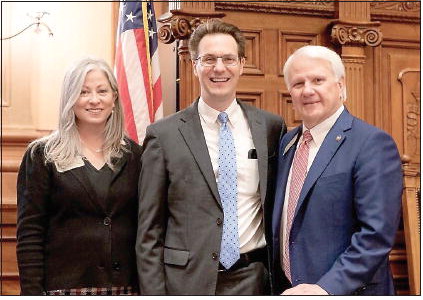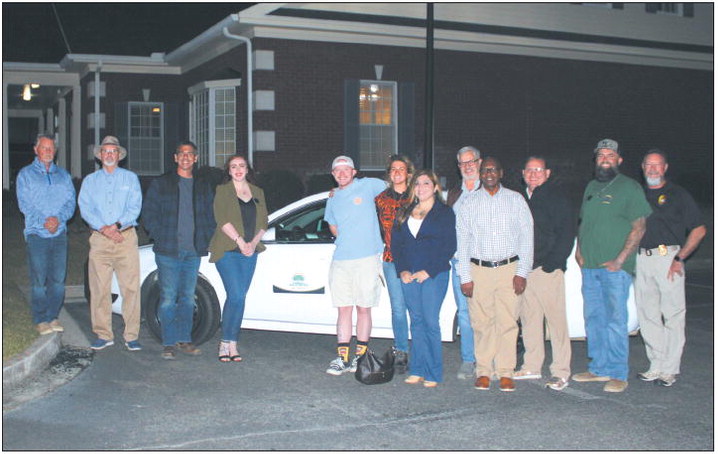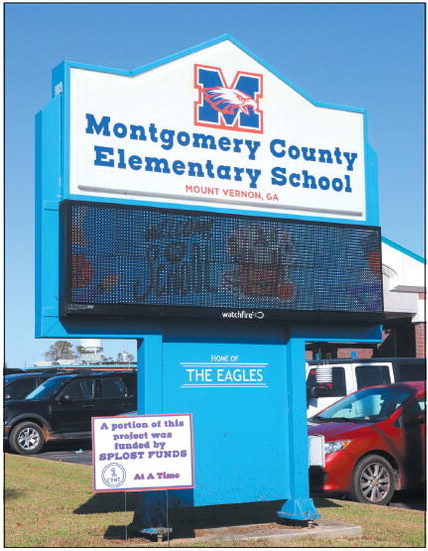House Passes Hagan’s Soapbox Derby Bill


O n Tuesday, Fe b r u ary 6, the General Assembly returned to the State Capi tol for a busy fifth week of the legislative session. The House met for four days, and our days are certainly getting longer and busier as we move further along in the session. Last week, we successfully passed several bills and continued our committee work. Some highlights of the week include the passage of the House’s version of the Amended Fiscal Year 2024 budget (AFY 2024) as well as the convening of a joint meeting of the House and Senate for the annual State of the Judiciary address.
The Soapbox Derby Bill
On Friday, the House resoundingly passed HB 1026 designating the Southeast Georgia Soapbox Derby in Lyons as Georgia’s official soapbox derby for the third time. During my presentation of the bill in the House chamber, I thanked all my fellow Representatives for their support and encouragement in attempting to pass this legislation recognizing a program that has done so much for so many young people over the years. It now passes over to the Senate. The Amended Budget Passes The AFY 2024 budget, or House Bill 915, is set at a revenue estimate of approximately $37.5 billion. Governor Kemp’s estimate for the amended budget includes $2 billion in surplus funds, bringing the total to $5 billion, and marking a 15.6% increase from the original estimate. The AFY 2024 budget provides substantial investments in technology, capital improvements, safety and security initiatives, economic development projects and human capital enhancements.
The House’s amended budget demonstrates a steadfast commitment to fostering economic development in our state, aligning with the governor’s vision for crucial initiatives. Noteworthy allocations in the AFY 2024 budget include: $23.9 million for the Rural Workforce Housing program, enhancing workforce housing availability, $250 million for low- interest loans to the Georgia Fund will support water and wastewater infrastructure development in local communities, $100 million each to the Regional Economic Business Assistance program and the OneGeorgia Authority. These funds are pivotal in making Georgia an attractive destination for businesses contemplating expansion or relocation.
$102.5 million to the Department of Education for the Quality Basic Education Formula midterm adjustment. Recognizing the growing student population, this investment ensures the DOE has the resources required to support students effectively.
$1.57 million for ex panding the Communities in Schools program, offering crucial support in attendance, behavior, academic performance, retention, and graduation; $3.9 billion for infra structure and $509 million for the Freight Infrastructure Projects program to enhance Georgia’s freight network, $200 million for the Local Road Assistance Administration Program, improving local transportation infrastructure statewide, $500 million is direct ed towards improving the health and funding ratio for the Employees Retirement System of Georgia.
$4.6 million for the Georgia Department of Corrections to establish 400 transitional beds at the Metro Re-entry Center, aiding former inmates with crucial resources upon release.
$300 million for a one-time salary supplement of $1,000 for state employees and teachers.
The House’s AFY 2024 budget advances to the Senate, where we expect modifications before achieving final passage. These strategic appropriations reflect our ongoing commitment to enhancing Georgia’s economic landscape, education system, transportation infrastructure, and overall well-being. Tax Relief for Georgians
The House gave unanimous passage to a legislative package aimed at providing Georgians and their families with much-needed tax relief from inflation that continues to impact our wallets on a daily basis. On Thursday, the House took up HB 1015, 1019 and 1021. First, HB 1015 would lower the individual income tax rate effective January 1, 2024, from 5.49% to 5.39%, which would return another $1 billion to Georgia taxpayers. Next, HB 1019 would increase the statewide homestead exemption from $2,000 to $4,000, provided the owner resides in the home as their primary residence. Lastly, HB 1021 would increase the child tax deduction from $3,000 to $4,000. With rising childcare costs, this legislation would allow for an extra $1,000 deduction per child, which could help alleviate some of those costs for parents. Each of these measures would support local economies by returning more dollars back into the pockets of our taxpayers. All these bills have now passed over to the Senate. Other Bills that Passed the House Include House Bill 883, which would authorize county boards of health to conduct meetings by teleconference; House Bill 945, which would require state health plan insurers to continue coverage when a hospital that is in-network becomes out-of-network with the insurer before the end of the plan year. This would apply to contracts on and after July 1, 2024; House Bill 959, which would update the Spencer Pass Law to provide guidelines when drivers are approaching and passing a stationary motor vehicle when individuals are present outside of the vehicle or the vehicle is flashing its hazard lights; House Bill 1034, which would designate the fourth Friday in November as National Sugarcane Syrup Day. Visitors at the Capitol
Austin Futch, Fitzgerald Realtor and candidate for Ben Hill County School Board, met with me last week to talk about issues relating to personal property rights.
Mark Anners of Vidalia visited for Georgia Lions Clubs Day at the Capitol.
A group of Toombs County Realtors visited on Thursday for Georgia Association of Realtors Day, including Arlene Davis, Ross Kelly, Pat Mitchell, Sara Brown, Marjorie Anderson, and Amy Williams.
Jason Dunn, board member of Children’s Advocacy Centers of Georgia, was in town for their Day at the Capitol. CACs provide child victims and their non-offending family members with the services they need to begin their journey toward justice and healing. I was proud to co-sponsor a resolution acknowledging Georgia’s CACs important work.
Matt Hasbrouk, CEO of Memorial Health Meadows Hospital, joined me in the House chamber to meet Speaker Jon Burns. He was in town for a Hometown Health meeting. They are a network of rural hospitals and healthcare providers.
The pace under the Gold Dome is picking up as we approach the looming “Crossover Day” deadline of February 29. Crossover Day is the last day that a bill can pass out of its chamber of origin and still be eligible for consideration this session. As we approach this deadline, I encourage you to reach out with your questions or concerns regarding any legislation that we are considering. You can reach me via email at Leesa.Hagan@house.ga.gov. It’s a continual honor to serve as your representative. Thank you for your trust and support.

By Leesa Hagan R-Vidalia (District 156, Georgia House of Representatives)







